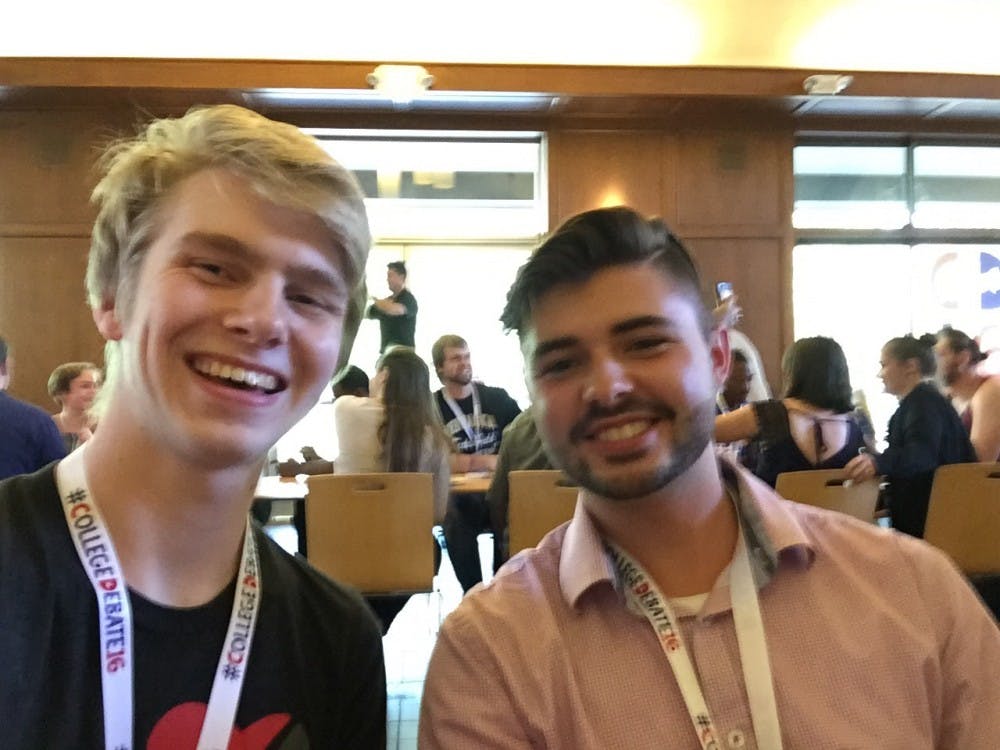AU students are on the go year-round, and that only intensifies as the temperature gets warmer and the spring semester ends. From political conventions in California to volunteer trips in South America and beyond, summer takes students away from AU and into the world around them. This summer, the Eagle is launching a summer series chronicling their adventures. Join us as we publish a new story weekly on how students are spending their summer #AwayFromTheNest before they return to campus in the fall.
Rising junior Berk Ehrmantraut got the experience of a lifetime this June serving as AU’s delegate to the 2016 College Debate convention at the Dominican University of California in San Rafael. Representing 150 college campuses from across the nation, College Debate allows students to gather and discuss political issues facing young people in the U.S. today.
With an emphasis on the use of social media and technology as tools of communication, College Debate helps their student delegates learn how to engage their peers in politics and the issues that have an impact on the everyday lives of students. The Eagle chatted with Ehrmantraut to talk about his California adventures, and how he will bring this experience back to AU in the fall in this week’s edition of #AwayFromTheNest.
EAGLE: How did you get involved in College Debate?
BE: My professor for my Intro to CLEG class sent me an e-mail and thought that [it] would be a good opportunity, so I signed up to do it and my application got accepted. We had to fill out some information about ourselves and the issues we’re passionate about and why we would be a good delegate.
EAGLE: What was your favorite speaker or event at College Debate? What was the main focus of this event?
BE: We got to see the California Secretary of State, Alex Padilla, and it was really neat to see him speak because we were there right before the California primary, so he was getting prepared for that and we got to ask him some questions. I actually got to ask him a question about whether California was looking at eventually moving voting online because right now they’re trying to make voting more and more accessible to people.
EAGLE: What political issues are the most important to you? How were you able to focus and talk about these at College Debate?
BE: The issues that I’m most passionate about are health care and making sure everyone has health care, immigration and making sure that we’re a nation that welcomes people, and addressing gun violence. At College Debate we actually got into small groups and we were able to talk to people with varying political ideologies and really just have a discussion about “the issues.” So, we had one group session breakout about immigration and I ended up talking to someone who had totally opposite views on what immigration should be and how we should handle it. But it was a really interesting conversation and a chance to engage with people with different views, which I don’t really get to do often.
EAGLE: How do you hope to bring your experiences at College Debate back to AU in the fall?
BE: This was actually just our training session and we’ll be going back there in September for an actual convention that we’re having. So up until that point we’re going to be trying to get people registered to vote and trying to connect with some organizations on campus to get people registered to vote. [We’ll also] try to host and organize events to try and get people engaged in the political process, but that’s not too difficult at American where people are really politically engaged, but I just want to try to help drive that engagement during the election season.
EAGLE: How did this convention change your perspective on the political landscape for young people and why do you think is it important for young people to be informed about political issues?
BE: It was really interesting to see young people of all political ideologies, because when I’m with my group of friends, we all have fairly similar ways that we look at the world, so it was interesting to see the way young people from all over the country, all kinds of different schools, with different perspectives, which is a chance I don’t usually get.
I think it’s important for young people to be informed because they are things that can really affect them. For example, the cost of college is something that we’re all dealing with, [especially] going somewhere like American, and there are things that happen in Congress and the political system that really affect what the cost of college is going to be, and how we’re going to pay for it, and other things like health care. There are decisions made everyday [in the government] that really affect that.





